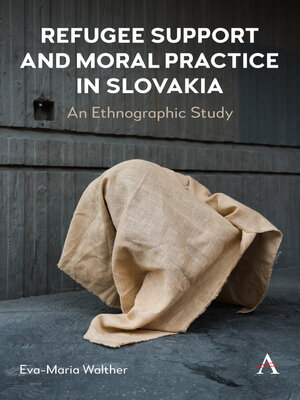Refugee Support and Moral Practice in Slovakia
ebook ∣ An Ethnographic Study · Anthem Series on Russian, East European and Eurasian Studies
By Eva-Maria Walther

Sign up to save your library
With an OverDrive account, you can save your favorite libraries for at-a-glance information about availability. Find out more about OverDrive accounts.
Find this title in Libby, the library reading app by OverDrive.



Search for a digital library with this title
Title found at these libraries:
| Library Name | Distance |
|---|---|
| Loading... |
This ethnography explores the political quandaries and personal dilemmas that refugee supporters—volunteers and NGO employees—in Slovakia face while working with their target group. Operating in a refugee-hostile political and public climate, they navigate scarce or absent refugee care infrastructures and strict supervision by state authorities. Building on extensive participant observation in three different refugee support organizations, the book shows how moral codes and emotional templates shape the implementation of refugee support, structuring encounters and clashes between refugees, helpers, and bureaucrats. The ethnography illustrates how, despite a plenitude of divergent constraints, the actors produce remarkably permanent makeshift solutions for "good enough" care.
At the same time, it is on the level of personal encounters and clashes that ideological and practical delineations between state and non-state actors, and between refugee-hostile and refugee-friendly positions, become blurred: NGO refugee supporters sometimes converge with state policies in practices of control while state authorities occasionally become deeply invested in providing empathetic care.
The book revisits narratives of illiberal backsliding and xenophobia in Central and Eastern European countries by describing the complicated emergence and perpetuation of refugee-hostile sentiments in an exemplary setting.
|Slovakia has never been a major destination for refugees or migrants and follows a strictly anti-refugee politics. Like other formerly socialist countries in Central Europe which are now EU member states—especially its fellow Visegrád countries Poland, Hungary, and the Czech Republic—Slovakia fiercely rejected refugee redistribution during the "long summer of 'migration" in 2015–2016. Meanwhile, the few refugees living in Slovakia face restrictive authorities and deficient support infrastructures. Building on ten months of ethnographic fieldwork carried out between 2017 and 2019 and focusing on those often-overlooked actors who do support refugees as NGO employees or volunteers, this book provides an empathetic and ethnographically rich account of their everyday efforts to accommodate 'refugees' needs and state 'authorities' expectations.
The book explores those engagements not as negotiation of political or ideological positions, but primarily as emotional and moral practices. It argues that moral codes and emotional templates shape the implementation of refugee support, structuring encounters and clashes between refugees, helpers, and bureaucrats. They generate lasting formal or informal solutions and even inform new policies in refugee care. Closely connected to this observation is a second finding, namely, that moral dilemmas and conflicting emotions often cause more distress and greater complications than the political controversies surrounding the topic. Actors on opposite ends of the political spectrum—like liberal NGO employees and state bureaucrats—experience the same conflicts of conscience and adopt the same indecisiveness.
These findings challenge the common characterization of the Slovak and other post-socialist societies as being divided between hegemonic populist, illiberal and xenophobic forces on one hand, and a much smaller and less influential liberal and cosmopolitan discourse on the other. Rather, actors blur or adapt their visions of what migration policy should ideally look like while engaging in the complicated practice of refugee care. The dynamics described in this book can increasingly be observed in western European countries as well, as mainstream political and public discourse has...







